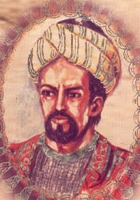Abu at-Tayyib al-Mutanabbi Biography
Abu at-Tayyib Ahmad ibn al-Husayn al-Mutanabbi (Arabic: أبو الطيب أحمد بن الحسين المتنبّي Abū aṭ-Ṭayyib ʾAḥmad ibn al-Ḥusayn al-Mutanabbī) (915 – 23 September 965) was an Arab Iraqi poet. He is considered as one of the greatest poets in the Arabic language. Much of his poetry revolves around praising the kings he visited during his lifetime. Some consider his 326 poems to be a great representation of his life story. He started writing poetry when he was nine years old. He is well known for his sharp intelligence and wittiness. Al-Mutanabbi had a great pride in himself through his poetry. Among the topics he discussed were courage, the philosophy of life, and the description of battles. Many of his poems were and still are widely spread in today's Arab world and are considered to be proverbial.
His great talent brought him very close to many leaders of his time. He praised those leaders and kings in return for money and gifts. His powerful and honest[citation needed] poetic style earned great popularity in his time.
Al-Mutanabbi was killed because one of his poems contained a great insult to a man called Dhaba al-Asadi (Arabic: ضبة الأسدي Ḍabba al-ʾAsadī).[citation needed] Dhaba, along with his Uncle Fatik al-Asadi (Arabic: فاتك الأسدي Fātik al-ʾAsadī), were determined to kill Al-Mutanabbi because of that poem which contained a great insult to Dhaba. They managed to intercept Al-Mutanabbi, his son Muhassad (Arabic: محسد Muḥassad), and his servant near Baghdad. Ibn Rachik reported that when Al-Mutanabbi wished to flee, his servant awkwardly reminded him of his bold verses; Al-Mutanabbi resolved to live up to them, fought, and died along with his companions in 965.
Courage to reason second place must take.
For valour should not balanced judgment shake.
...
Strong resolves come in proportion to men of determination,
and noble deeds come in proportion to magnanimous men.
...
My heart is aflame, burning with love for you
While your heart is frigid-cold toward me
...
Resolutions are measured against those who make them; generosity in accordance with the giver.
Littleness is magnified by small men, while grandeur is deprecated by the great.
Sayf al-Dawla imposes upon the army his will, yet seasoned armies cannot achieve it.
He asks from men all that he has in himself, though even lions would not claim to match that.
...
Beautiful women, as experienced men know,
Are but darkness wrapped in dazzling light aglow.
...
